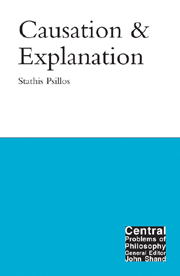3 - Causation and counterfactuals
from I - Causation
Summary
In the first Enquiry, after the statement of the first definition of causation, which, as the reader might recall, was a Regularity definition, Hume (E: 146) added the following, prima facie puzzling, remark: “Or in other words, where, if the first object had not been, the second never had existed.” But these are not merely “other words”. They offer a distinct definition of causation. They define causation not in terms of actual regularities, but in terms of a counterfactual dependence of the effect on the cause: the cause is rendered counterfactually necessary for the effect. Almost everybody agrees that counterfactual conditionals play an essential role in causation. But there is important disagreement on what exactly this role is. In this chapter, I shall examine in some detail two representative views of the role of counterfactuals in causation, one associated with Mackie and the other with Lewis. Finally, in section 3.4, I shall introduce the reader to two notable recent attempts to improve on earlier counterfactual theories.
The meaning of causal statements
Mackie makes a nice distinction between two sorts of question one can ask about RVC. First, does it capture the meaning of singular causal statements? Secondly, does it capture what constitutes causation as it is in the objects? (cf. 1974: 77). Although he himself offers an improved version of RVC (which we shall discuss in section 3.2), Mackie answers both of the foregoing questions in the negative.
Information
- Type
- Chapter
- Information
- Causation and Explanation , pp. 81 - 106Publisher: Acumen PublishingPrint publication year: 2002
